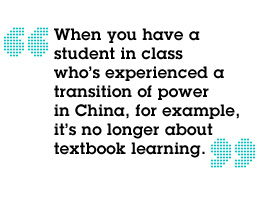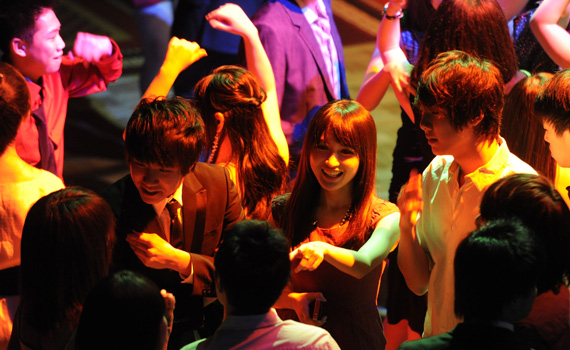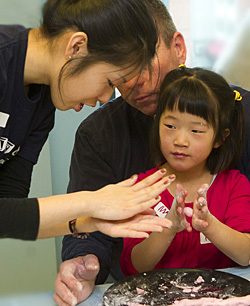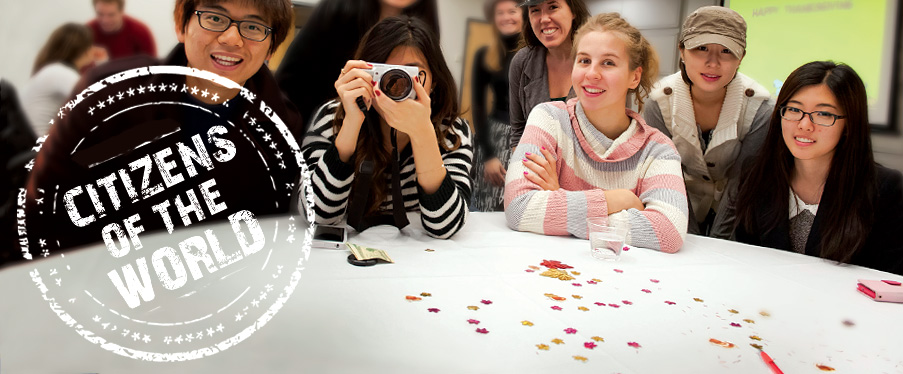Parent Magazine
China Comes to Campus
An influx of Chinese students is creating new opportunities for everyone at BU.
By Sheryl Flatow
Photo of international students celebrating Thanksgiving by Kalman Zabarsky
Boston University has a world-renowned reputation for embracing students from abroad: This school year alone, the University welcomed undergraduates from over 100 countries, ranging from A (Albania) to Z (Zimbabwe). Remarkably, nearly one-third of the 2,236 international undergraduates at BU came from the People’s Republic of China, more than triple the number from any other country.
Although BU has increased enrollment from abroad for decades, the jump in the Chinese student population is a development no one would have thought possible at the dawn of the new century. “Students from China did not have access to an undergraduate education in the West until five or six years ago,” says Kelly Walter, associate vice president and executive director of admissions at BU. “The system of education and the government didn’t allow for it, and students didn’t have the language skills. But everything’s changed in the education system in China, and there is now a middle class that is able to send children overseas.”
 American students are reaping the rewards of interacting with such a diverse population. “Our students are exposed to different experiences, different perspectives,” says Walter, “and I believe that has a profound impact on their lives, on how they think, on how they approach the world. When you have a student in class who’s experienced a transition of power in China, for example, it’s no longer about textbook learning.”
American students are reaping the rewards of interacting with such a diverse population. “Our students are exposed to different experiences, different perspectives,” says Walter, “and I believe that has a profound impact on their lives, on how they think, on how they approach the world. When you have a student in class who’s experienced a transition of power in China, for example, it’s no longer about textbook learning.”
The growing influx of students from overseas is also a boon to the country. From a fiscal perspective, international students contributed over $1.4 billion to the economy in 2011–12 in Massachusetts alone. And there are political and social advantages as well, as students return to their countries with a better understanding of life in America. According to Boris Yu (SMG’14), president of the BU Chinese Students Association (BUCSA), Chinese parents are now eager to send their children to the United States to study. “In general, Chinese parents believe their children will get the best education in this country,” says Yu, a native of Hong Kong. And more students can now benefit from that experience with the first endowed scholarship fund for mainland Chinese undergraduates, gifted by parent Benjamin Zhengmin Pan.

The BU Chinese Students Association's Lunar Ball. Photo by Cydney Scott
The wider Chinese population—from the mainland, the United States, Singapore, Hong Kong, and beyond—is having a lively impact on BU, with student associations and cultural and social programs that are transforming the fabric of the University. The BUCSA, for example, promotes Chinese culture on campus with events like Lunar New Year celebrations, while providing a community for Asian and Asian American students. “It’s important to us to try to create a family environment for Chinese students,” says Yu. The nurturing atmosphere is one reason that so many Chinese students are attracted to BU. “They know they’re not alone,” says Walter. “Our global reputation is strong, and it’s reassuring to students and parents that we have a commitment to our international students.”

Tina Choi (CAS'14), left, volunteers at the Dumplings Playgroup. Photo by Vernon Doucette
There are also opportunities for students to give back to the Chinese community, both on the mainland and in Boston, through the cultural club China Care Fund (BUCCF) and its offshoot, Dumplings. BUCCF is a student-run organization that raises funds for the China Care Foundation, with all the proceeds going toward sponsoring surgery for orphans in China. Dumplings Playgroup, run jointly by students at BU and MIT, is a fun and educational get-together for adopted Chinese children in Boston, ages four to nine, and their families.
“We meet every other week in Chinatown, and we do anything from storytelling to cooking to crafts to a puppet show,” says Geraldine Lai (COM’14), a native New Yorker and former coordinator of BU’s Dumplings program. “We also try to integrate some language into the program. We’re trying to pique the children’s interest in Chinese culture. But it’s really a place where they can play with other children like themselves and make friends, and where their parents can network. For me, it’s extremely rewarding to be a part of something bigger than myself, especially something that helps children who are a part of my culture.”
 Lai says that her involvement in China Care gives her not only “a sense of purpose,” but helped her shed some of her shyness. Yu echoes her sentiments: Meeting so many “diverse, friendly” people at BU, he says, has made him more easygoing and talkative. In fact, his entire BU experience has been transformative. “I’ll be interning at Pricewaterhouse in Boston this summer, and I found that position through the BU Center for Career Development,” says Yu, who plans to settle in Asia eventually to pursue a career in finance. “I’d like to gain a year or two of work experience in the U.S. after I graduate, because it will broaden my knowledge and my work habits. A lot of Chinese firms are realigning their corporate culture to be more global, to adapt to what international customers want. So it seems to be a definite advantage to have studied and worked abroad. With globalization becoming increasingly important, parents in China see Chinese students who have studied abroad come back home and become leaders in society.”
Lai says that her involvement in China Care gives her not only “a sense of purpose,” but helped her shed some of her shyness. Yu echoes her sentiments: Meeting so many “diverse, friendly” people at BU, he says, has made him more easygoing and talkative. In fact, his entire BU experience has been transformative. “I’ll be interning at Pricewaterhouse in Boston this summer, and I found that position through the BU Center for Career Development,” says Yu, who plans to settle in Asia eventually to pursue a career in finance. “I’d like to gain a year or two of work experience in the U.S. after I graduate, because it will broaden my knowledge and my work habits. A lot of Chinese firms are realigning their corporate culture to be more global, to adapt to what international customers want. So it seems to be a definite advantage to have studied and worked abroad. With globalization becoming increasingly important, parents in China see Chinese students who have studied abroad come back home and become leaders in society.”






